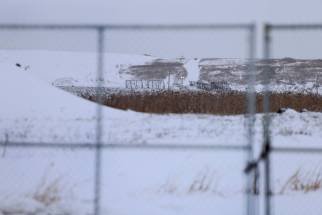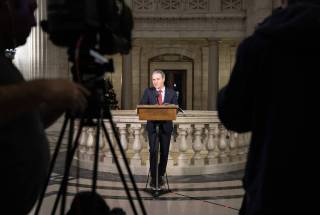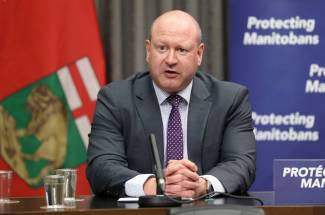Direction of windfall to steer Tories’ near future
Read this article for free:
or
Already have an account? Log in here »
To continue reading, please subscribe:
Monthly Digital Subscription
$0 for the first 4 weeks*
- Enjoy unlimited reading on winnipegfreepress.com
- Read the E-Edition, our digital replica newspaper
- Access News Break, our award-winning app
- Play interactive puzzles
*No charge for 4 weeks then price increases to the regular rate of $19.00 plus GST every four weeks. Offer available to new and qualified returning subscribers only. Cancel any time.
Monthly Digital Subscription
$4.75/week*
- Enjoy unlimited reading on winnipegfreepress.com
- Read the E-Edition, our digital replica newspaper
- Access News Break, our award-winning app
- Play interactive puzzles
*Billed as $19 plus GST every four weeks. Cancel any time.
To continue reading, please subscribe:
Add Free Press access to your Brandon Sun subscription for only an additional
$1 for the first 4 weeks*
*Your next subscription payment will increase by $1.00 and you will be charged $16.99 plus GST for four weeks. After four weeks, your payment will increase to $23.99 plus GST every four weeks.
Read unlimited articles for free today:
or
Already have an account? Log in here »
Hey there, time traveller!
This article was published 21/12/2022 (1089 days ago), so information in it may no longer be current.
From the look on his face, it was pretty clear Manitoba Finance Minister Cameron Friesen was going to get exactly what he wants for Christmas.
At a news conference Tuesday to discuss the province’s most-recent fiscal update, Friesen sported a sly grin as he announced his Progressive Conservative government will in all likelihood be in a position to table a balanced budget next year.
The fiscal turnaround is pretty remarkable.
After recording a small surplus in 2019, Manitoba finished the 2020-21 year with a record-breaking $2.1-billion deficit, thanks in large part to COVID-19 pandemic restrictions and associated costs. Friesen giddily reported the expected deficit for the current 2022-23 fiscal year, ending in March, is now $193 million.
JESSICA LEE / WINNIPEG FREE PRESS Finance Minister Cameron Friesen had no specifics on how his government would spend the windfall.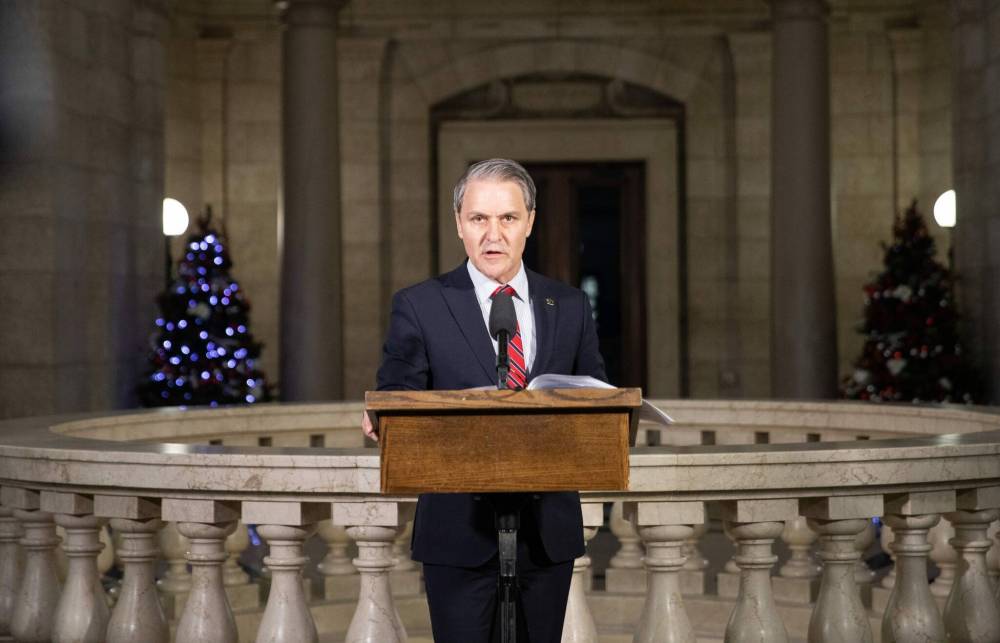
Suddenly, the PC government is very much in within range to announce a surplus in the 2023-24 budget, expected sometime in the first quarter.
Where did all the money come from?
Wage growth and inflation have helped restore much of what the province lost in income and sales taxes, respectively. Manitoba will also receive a huge increase in federal transfer payments, injecting $3.5 billion into the provincial treasury (an increase of $577 million over the previous year).
Manitoba Hydro’s record-breaking financial results (which figure into the summary budget bottom line) were the final piece of the windfall puzzle.
There is still a chance for all this to unravel.
This winter, COVID-19 variants (along with other respiratory viruses) will play havoc with the health-care system and drive up costs for government. As well, inflation and high interest rates could still push Canada into a recession.
For now, however, Friesen and the Tories are flush — and planning all sorts of ways to buy back some love from Manitoba voters.
JESSICA LEE / WINNIPEG FREE PRESS Finance Minister Cameron Friesen reported the expected deficit for the current 2022-23 fiscal year, ending in March, is now $193 million.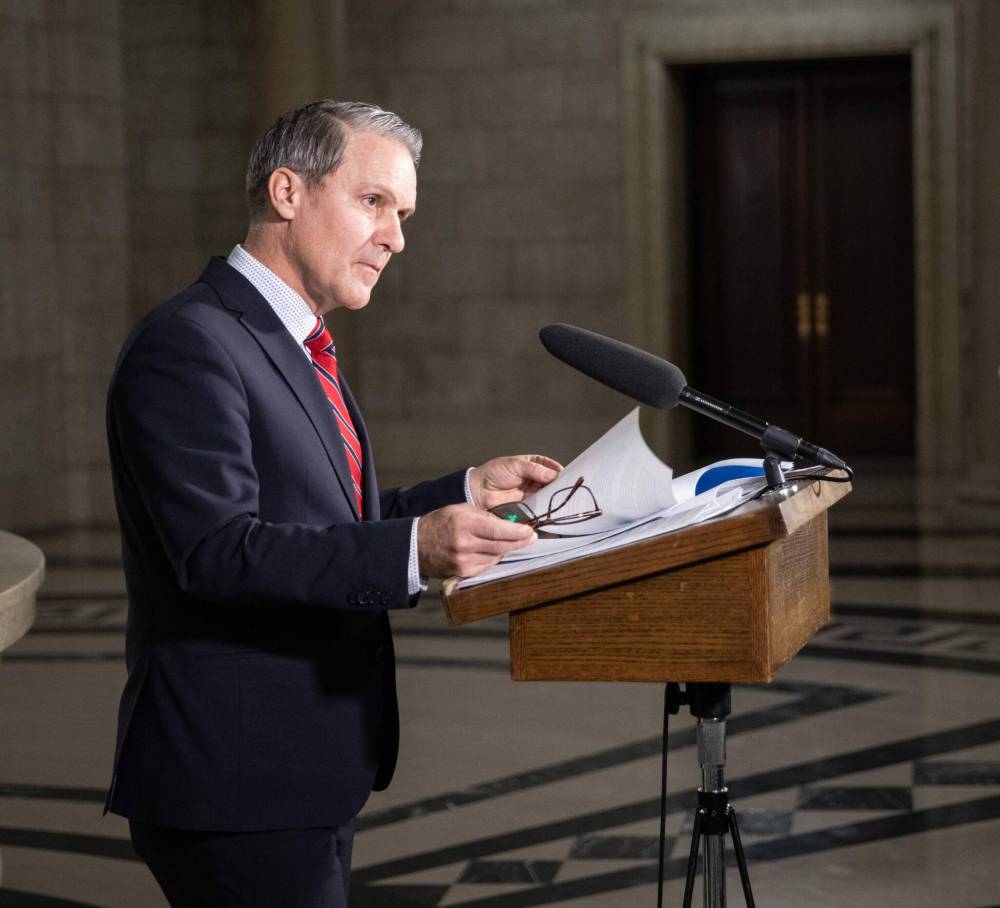
Friesen had no specifics on how his government would spend the windfall. Perhaps that was out of an abundance of caution amid the threat of recession. More likely, the finance minister is holding back the biggest and best goodies for the next budget.
Even so, Friesen did offer a few hints.
Health care, which has very much become the Tories’ Achilles heel thanks to austerity and mismanagement, will continue to receive more money. The PC government has staked its future on an ability to find more doctors and nurses, and to massively increase the number of surgical and diagnostic procedures.
However, Friesen also talked about additional “affordability measures” to help residents dealing with the high cost of living. On this issue, the PCs will face the greatest degree of peril.
In Tory lexicon, affordability measures is an elegant way of talking about tax cuts.
All things being equal, tax cuts targeted to help those most in need could theoretically be effective at helping those people struggling under the weight of inflation. Unfortunately, the $1.2 billion in tax cuts the Tories have delivered in recent years were neither targeted nor particularly effective.
A one-point cut to the PST, which erased $360 million in annual revenue, had the biggest impact for people buying big-ticket items. Another $450 million disappeared when the Tories started reducing the education portion of property taxes — a tax expenditure that provided huge windfalls to the Manitobans that own the biggest and most valuable homes.
Even a plan to index the Basic Personal Exemption (the amount of money you can earn before you start paying provincial income tax) was too small to do anything for the lowest-income Manitobans. And yet, it still costs the treasury $161 million a year.
The PC government is, indeed, in possession of a fiscal windfall. But how it utilizes that windfall will tell voters all they need to know going into the 2023 election.
The Tories have experimented with other ways of providing direct relief, with similarly bad outcomes. In August, the PC government sent inflation-buffering cheques to Manitoba families with a household income of less than $175,000, a clear sign the Tories do not really know who is suffering most.
Can the grinning finance minister conjure a better form of tax cut, one that will provide real relief and good value for the treasury and in the process, rebuild Manitobans’ faith in his government?
Unlikely.
The Tories balanced the budget in 2019, ahead of schedule, by capping funding for health care, education and grants to municipalities, while collecting record transfer payments from Ottawa. It’s a strategy that left core government services, health care in particular, and the reputation of the PC government, in tatters.
It has also left the Tories with precious little time to reverse course.
The PC government is, indeed, in possession of a fiscal windfall. But how it utilizes that windfall will tell voters all they need to know going into the 2023 election.
Will the Tories invest in core services and, in so doing, reverse damage done by austerity and mismanagement?
Or will they squander the windfall on meaningless and ineffective tax cuts and, in the process, convince Manitobans once and for all the Tories have reached their best-before date?
Smiling Cam Friesen is strongly leaning towards the latter.
dan.lett@freepress.mb.ca

Born and raised in and around Toronto, Dan Lett came to Winnipeg in 1986, less than a year out of journalism school with a lifelong dream to be a newspaper reporter.
Our newsroom depends on a growing audience of readers to power our journalism. If you are not a paid reader, please consider becoming a subscriber.
Our newsroom depends on its audience of readers to power our journalism. Thank you for your support.




